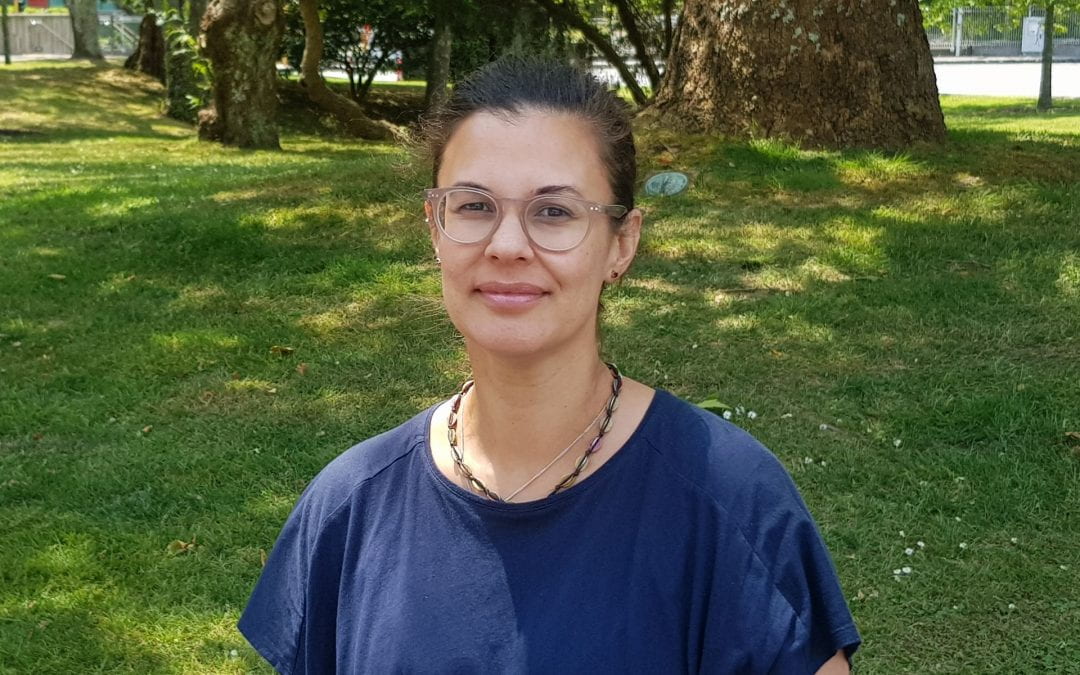Elizabeth Holt knows Pacific people are facing problems accessing hearing health care, and the Eisdell Moore Centre’s Pacific Research Co-ordinator is looking for answers.
She knows Pacific children in New Zealand are over-represented in otitis media (glue ear) statistics, she knows there are similar problems in many Pacific countries, but she also knows from her PhD research that one Pacific country in particular is the exception to the rule.
“We know the general things that cause barriers for health care access [in New Zealand] for Pacific people,” she says.
“But in terms of [barriers] specifically to do with hearing health and hearing health care services, that’s a little bit more … anecdotal.”
Elizabeth’s work for the Eisdell Moore Centre (EMC) is to improve research on the hearing health of Pacific people in New Zealand and in the Pacific; to identify the issues and barriers they face; and to look at potential solutions.
At the same time, she is working on her PhD, studying the ear and hearing health of Niuean children, and while that research lets her draw parallels with her wider work for the EMC, it is also showing that good access to health services can produce vastly different outcomes.
Elizabeth, who has a Bachelor of Health Science in physiotherapy, a Post-Graduate Diploma in Public Health, and a Master of Public Health, says a key barrier to solving the hearing health issues facing Pacific people has been a lack of solid data.
She discovered that problem when she was on a 2013 internship with the World Health Organisation (WHO) in Geneva as part of her diploma in public health, and it is one of the reasons she’s now working on hearing health.
Elizabeth was tasked by the WHO with finding information on hearing loss and related issues among Pacific people – and she found virtually nothing.
“That made me think, well if the WHO can’t get the information… something needs to be done,” she says. “I realised there was a real need in this area.”
Working in public health in New Zealand, Australia and England for more than a decade, Elizabeth knew health systems were often not responding adequately to peoples’ needs, and tthat made her want to study public health systems in greater depth.
“I was very much aware of how public health can improve the health of populations, [but] I felt like I was always the ambulance at the bottom of the cliff,” she says.
Elizabeth, whose mother is Tongan and who has extensive experience of Pacific life, knew before she took up her five-month internship at the WHO, that there was significant ear disease in Pacific children in New Zealand, but discovering such a lack of meaningful data was an eye-opener.
Building on her diploma, she began her Masters degree in 2014, focusing on otitis media in Pacific children and exploring the potential of a programme to identify its causes, and strategies to reduce it and manage it and its consequences. It’s work that’s part of her programme with the EMC.
She says that with otitis media, Pacific – and Māori – children needing early intervention the most, are often the least likely to get it.
“If you’re looking at it from a public health perspective they’re more likely to be exposed to the risk factors for otitis media, such as poor housing, overcrowding – poverty essentially,” she says.
“[But] barriers to accessing timely health care … is a big problem. [The children] get identified and treated much later than actually they need to be.”
Talking to Pacific health professionals, she says some of the barriers can include stereotyping, while one of the answers, she believes, can be cultural.
“We do know that by providing a Pacific primary health care service, such as we have in West and South Auckland, the patients can speak their own Pacific language, things are done in a culturally appropriate manner – for example they can bring their family – and information can be given in their own language,” she says.
“That reduces the anxiety around accessing a service you feel is not for you.”
Elizabeth’s three-year work programme with the EMC, which started in late 2018, includes understanding the barriers to accessing health care and facilitating research around Pacific hearing health.
She is also conducting a survey of Pacific hearing health services, is working with the EMC to organise a public health hearing course for Pacific clinicians in October, and is following that with a regional meeting with the WHO and The Pacific Community Organisation, which is working to expand ear, nose, and throat (ENT) and audiology services in the Pacific.
At the same time, her PhD on middle-ear health and hearing among children in Niue, where hearing health is so well catered for, is showing what good practice can achieve.
Eisdell Moore Centre Director Professor Peter Thorne says the centre is looking to work such as Elizabeth’s to help drive strategies around Pacific hearing health and to encourage more research.
“The work is critical to the centre,” he said. “We’re committed to seeing more research with Pacific communities as part of our strategic mission.”
